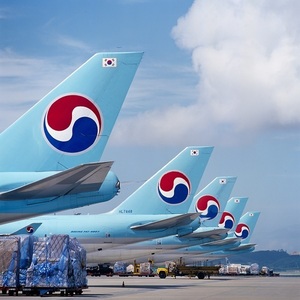Korean Air introduces cargo SAF program

November 28, 2023
BY Korean Air
Korean Air will launch a program to use sustainable aviation fuel (SAF) for air cargo operations in cooperation with air cargo customers and forwarders.
Customers can make customized contributions through the Korean Air Cargo SAF program and reduce their carbon footprint. Korean Air will use the contributions to purchase additional SAF and share with customers the amount of carbon emissions reduced by using SAF.
The airline’s initiative is a part of its ongoing effort to reduce carbon emissions and raise awareness in the air cargo sector to achieve net zero carbon emissions by 2050.
SAF is an environmentally-friendly aviation fuel derived from alternative raw materials that may be blended with existing conventional jet fuel. From production to consumption, sustainably-produced SAF may reduce carbon footprint up to 80% compared to existing fossil-derived aviation fuel. IATA expects SAF to account for 65 percent of the mitigation needed to achieve the industry’s net zero goals by 2050.
Korean Air has been at the forefront in paving the foundation for SAF usage in the Korean domestic aviation industry. The airline has actively participated in the Korean government’s “eco-friendly biofuel activation alliance” since last October, to introduce and promote new biofuel in Korea. The airline will continue to work with stakeholders in the government, private institutions, and refiners to review various domestic and international demonstration projects to increase SAF production and application.
“We're pleased to work together with our clients to reduce carbon emissions from cargo operations through the SAF program,” said Jaedong Eum, senior vice president and head of Korean Air’s Cargo Business Division. “Korean Air is committed to sustainable development with our next generation in mind.”
Advertisement
Advertisement
Advertisement
Advertisement
Related Stories
The U.S. Energy Information Administration maintained its forecast for 2025 and 2026 biodiesel, renewable diesel and sustainable aviation fuel (SAF) production in its latest Short-Term Energy Outlook, released July 8.
XCF Global Inc. on July 10 shared its strategic plan to invest close to $1 billion in developing a network of SAF production facilities, expanding its U.S. footprint, and advancing its international growth strategy.
U.S. fuel ethanol capacity fell slightly in April, while biodiesel and renewable diesel capacity held steady, according to data released by the U.S. EIA on June 30. Feedstock consumption was down when compared to the previous month.
XCF Global Inc. on July 8 provided a production update on its flagship New Rise Reno facility, underscoring that the plant has successfully produced SAF, renewable diesel, and renewable naphtha during its initial ramp-up.
The USDA’s Risk Management Agency is implementing multiple changes to the Camelina pilot insurance program for the 2026 and succeeding crop years. The changes will expand coverage options and provide greater flexibility for producers.
Upcoming Events










